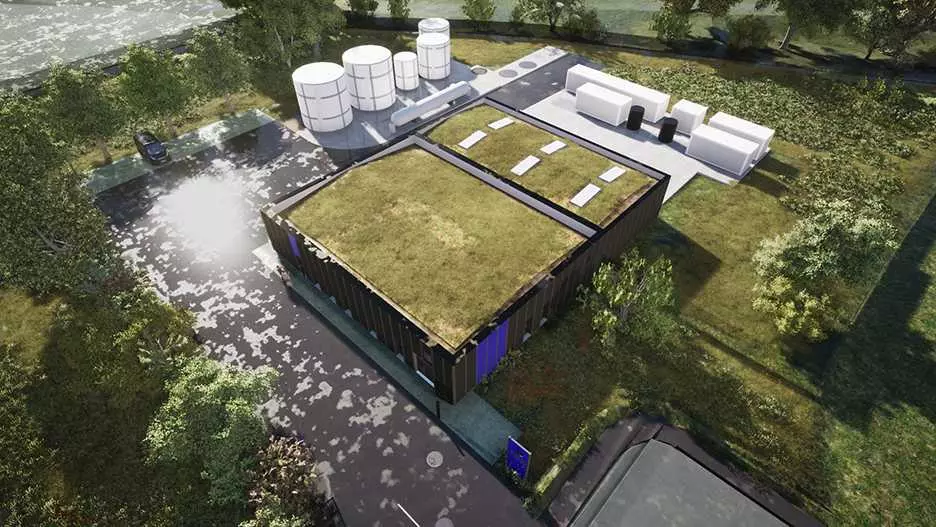Faced with more frequent heat waves and the growing demand for water due to the popularity of its coastline, the Vendée has launched an experiment that is unprecedented in Europe: the Jourdain programme. On 9 July in La Roche-sur-Yon (France), Vendée Eau, the Loire-Bretagne Water Agency and Veolia - represented by its CEO Antoine Frérot - launched the construction of a refining plant to produce very high quality water from wastewater and provide the region with additional drinking water.
In the Vendée, 9 out of 10 litres of drinking water are produced from surface water that is particularly sensitive to the effects of climate change. In addition to actions promoting water conservation, the department's public drinking water utility -Vendée Eau- is anticipating the risk of a future water shortage and has chosen Veolia's REUT (Reuse of Treated Wastewater) solution, as part of the Jourdain project.
A new water cycle
Jourdain is a global circular water economy programme. It involves reproducing the water cycle in a planned and supervised way: Instead of being discharged into the Atlantic Ocean, part of the water leaving the Sables d'Olonne wastewater treatment plant is recovered for further treatment in a refining plant: 5 successive stages eliminate salinity, microbiological compounds and micropollutants such as pesticides, pharmaceutical or industrial compounds. The water is then transported over 25 km to the Jaunay dam where it is released into a vegetated area to return to its natural state. It rejoins the river and flows slowly into the Jaunay reservoir. The water ends its circuit in the local drinking water production plant, which makes it available for consumption by households. With this global solution, Veolia is meeting the environmental and health objectives of Vendée Eau to produce very high quality water.
Key project data:
- 4.5 million m3 of wastewater are treated each year by the Les Sables d'Olonne wastewater treatment plant, equivalent to the volume of water in one of the 13 Vendée dams.
- 150 m3/h will be treated by the refining plant during the experimental phase (from 2023 to 2026), i.e. a quarter of the discharges from the urban area. Then the entire 600m3/h (from 2027), i.e. a potential additional resource of 1.5 million m3 of drinking water over the period from May to October during dry years.
- Technologies used in the refining plant: ultrafiltration and low-pressure reverse osmosis (Barrel Plug and Play, designed by Veolia, containing 200 membrane elements), ultraviolet disinfection and chlorination.
- Overall budget for the Jourdain programme: 19.5 million euros over 10 years.

Democratising the REUT solution in France and beyond
The Jourdain programme is a pioneer in France and in Europe. It is conducting experiments on the reuse of refined wastewater from the Sables d'Olonne wastewater treatment plant with four objectives: to implement a solution for areas with a shortage of water resources in Summer, to recover water in a circular manner for additional input into reservoirs, to validate the refining process by proving that it has no impact on the natural environment, and to change the legislation in order to democratise the REUT solution in France and beyond.
The Jourdain experimental stage enables Vendée Eau to anticipate and plan what the optimal water reuse solution should be, in its long-term configuration. The 2040-2050 time frame is being planned today. Jacky Dallet, President of Vendée Eau.
This unprecedented experiment in Europe allows us to test a project that can be reproduced in other parts of the country, as the Loire-Breton coastline represents 40% of the French coastline. Martin Gutton, Director of the Loire Bretagne Water Agency.
REUT is one of the essential solutions that will enable us to respond to the problem of repeated drought and water stress in France. The French are in favour of it, since 83%(1) of them say they are ready to drink water produced from treated wastewater. I would like to thank Vendée Eau for putting its trust in Veolia. Antoine Frérot, CEO of Veolia.
(1) An Elabe study on the subject of "the French and wastewater recycling".
Why the name Jourdain?
The name of the programme was inspired first and foremost by the character of Mr Jourdain in Molière's Bourgeois Gentilhomme, who discovers that he is writing prose without knowing it. Just like Mr Jourdain, the water we consume every day already has a history without us being aware of it: many watercourses receive discharges from wastewater treatment plants and this water, downstream, is transformed into drinking water. So we are all already engaged in wastewater reuse without knowing it. The Jourdain programme reproduces this water cycle in a planned way by securing water resources.
The name of the programme also refers to the 360 km long Jordan River, which flows through Israel, south-east Lebanon and into Lake Tiberias. Its resource, much coveted by the countries that border it, is becoming limited. Israel has become a role model for its reuse of more than 90% of its drinking water: it recovers 520 million m3 of treated wastewater per year to supply 9 million inhabitants. And 50% of its recycled water is used to irrigate cultivated land.
Project schedule
- 2023: Completion of the refining unit. Construction of the pipeline and vegetated area.
- 2024-2026: Assessment of environmental, health and social impacts.
- 2027: Assessment and evaluation of the Jourdain programme. Extension of the capacity to 600 m3/h subject to the necessary authorisations.
Credits: Main picture ⓒ Atelier RVL Architectes - Tours


